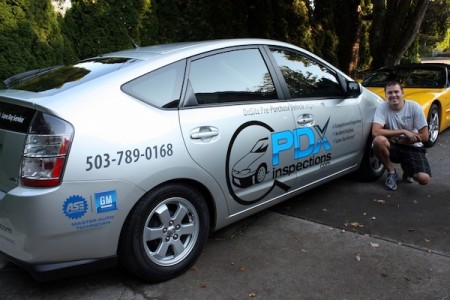Be sure to also check out our own more in depth tips page on how to find a quality used car
This information is a cut and paste from Portland’s Police Bureau – http://www.portlandoregon.gov/police/article/187076
Basic information but useful
1. Check car-fax. Anyone with internet access can go to www.carfax.com and check a vehicle by its VIN number. Carfax charges a small fee but it is well worth it. Check with your local police agency to see if the vehicle is stolen. Remember, if you buy a stolen car, you may not recover your money even if the person that sold it to you is arrested. It is up to you to be sure that the vehicle you are buying is legitimate.
2. Craigslist, Ebay: Craigslist and Ebay have hints on how to avoid scams. Be aware that most of the sellers on internet auction and classified ad sites are legitimate. However you assume the risk when making a purchase so check the sellers history if you are able to.
3. Suspicious sellers and cars: Anyone selling you a car should have a title. If they don’t, walk away from the deal. There are many reasons why a person may not have a title, but there is no reason to buy a car without one. If you buy a car without a title, you will have to go to DMV and apply for a lost or stolen title. By that time you may realize that you have bought a stolen car. Even if it’s not stolen, you will have to prove that you legitimately own the car now. Avoid that hassle and only buy cars with titles.
4. Be suspicious of deals too good to be true. There is a reason that the person is selling a car so cheaply, and most of them are not good for the buyer. Look the title over for signs of fraud (erasures, copies, VIN number does not match vehicle, vehicle description does not match vehicle, mileage is inconsistent.) If the vehicle has been totaled and rebuilt the title should note that it is either a salvage vehicle or a reconstructed vehicle. If there are indications that the vehicle has been rebuilt, but there is no flag on the title, be suspicious.
5. Ask for ID of the seller to prove that the name on the title is the person you are dealing with. If it is a private seller and not a dealer, they should be the person listed on the title. If they are a dealer, they should have a dealer’s license and should have no problem proving that they own the car they are selling. No legitimate seller will have a problem with telling you who they are.
6. If you are selling a car it’s up to you what you accept for payment. It’s recommended that you only take cash and cashier’s checks. Call the bank listed on the cashier’s check to check the funds. If you accept a personal check, you assume the risk, even if it appears legitimate.
Additional Common-Sense Advice for Buyers from Autotrader.com
Buying a car you find online is a lot like buying a car through a classified ad in the newspaper. In either case, use your best judgment.
- Know the car’s market value
- Be suspicious of a vehicle priced significantly below market value. If it sounds too good to be true, it probably is.
- Obtain a vehicle history report
- A vehicle history report can provide useful information, such as who holds the title to the car and whether the car has been in an accident reported to authorities. You’ll also find out whether the car was ever reported stolen, salvaged or damaged. (We include a History report and often additional information with every inspection)
- Inspect the car
-
Schedule an inspection with a professional mechanic or an inspection service if the car is not in your area. An early inspection can help you identify problems. However, keep in mind that an inspection isn’t a warranty and won’t guarantee a car is free from defects or that inspectors have identified all existing problems.
- Confirm contact information
- Before you send payment, verify the seller’s street address and phone number- an email address is not enough. ZIP codes, area codes and addresses should match up. Be wary if the seller is located overseas. (BAD ADVICE – Work with sellers face to face only)
- Use email wisely
- Avoid sending sensitive personal or financial information (such as your social security number, credit card number or checking account number) to a seller via email. Remember that email communications are not secure and can be easily forwarded to others.
- Get a detailed receipt
- Ask the seller for a receipt that states whether the vehicle is being sold with a warranty or “as is.”
- Get title to the vehicle
- Make sure you know what’s required in your state to transfer title to the vehicle you’re buying.

